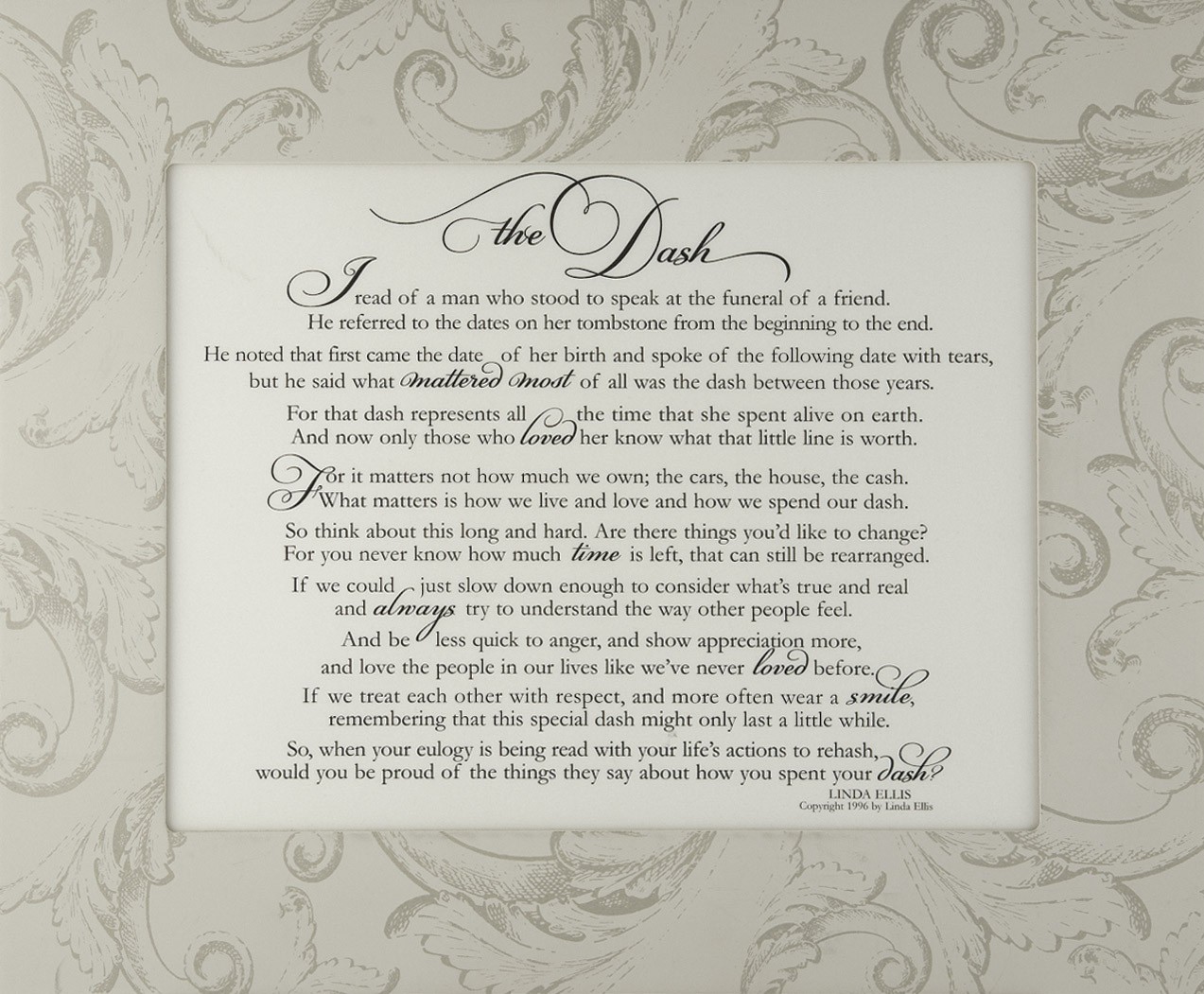1 John 5:9-13, Easter 7 B, May 17, 2015
Grace and peace be unto you from God our Father and our Lord and Savior Jesus Christ, Amen.
Have you heard the poem by Linda Ellis titled, "The Dash"? You probably have. It is commonly used at funerals and visitations to celebrate a life lived well. The narrator of this poem considers a tombstone, including the person's birthdate, deathdate, and the dash in between. Here are three lines from the poem:
"He said what mattered most was the dash between those years.
For that dash represents all the time they spent alive on earth.
And now only those who loved them know what that little line is worth."
"The Dash" is a powerful reminder of the importance of our lives and how we live them. When we grieve for a life ended, we are reminded how precious our few years on this earth can be. We will be remembered by our dash. Ultimately, our birth and death dates don't matter much. It is the time between that matters.
Yet when we look at Jesus, we see that his dates matter more than his dash. We will spend the entire second half of the liturgical year considering that dash. We will read about his ministry, including the lessons that he taught, the sermons that he preached, the miracles that he performed, and the people that he healed.
Jesus had an amazing dash, and we need six months every year to learn from him and follow his example. But Jesus doesn't give us eternal life primarily because of the life that he lived. Those dates surrounding the dash are what matter.
If you think about it, Jesus has two dashes representing his time here on earth. Jesus doesn't have a tombstone, yet I wonder what his would look like? Would it say:
Christmas Day dash Good Friday
Easter Day dash Ascension Day
Jesus has four important dates marking his life, not the two that we have. These four dates have encompassed the first six months of the liturgical year. We started our retelling of Jesus' story last November when Advent began. We waited - a bit impatiently - for Christ to be born.
Then all too soon Lent came when we were preparing for his death. We grieved for Christ, only to celebrate on Easter morning. Then Jesus remained on earth resurrected for some time before he ascended into heaven. This past Thursday was the official feast day to celebrate Jesus' ascension.
We take six months of every year to relive Christ's life and giving of life. These events from over two thousand years ago are so important that we recall every last detail. We act it out. We sing about it. We cherish these beloved stories.
These four moments in Christ's life need to be held together to comprise his saving act. We have eternal life not just because of Jesus' life or even his death. We have eternal life because of all four of his dates surrounding those dashes.
In 1 John, we heard this morning: "This is the testimony: God gave us eternal life, and this life is in his Son." So, God gives us life eternal because of Jesus' birth, death, resurrection, and ascension.
Just as Jesus' life didn't end at his death, so also our lives won't either. After we leave this earth, we will remain with God forever. Our eternal life doesn't begin at our death, though. We experience a better life now because of what God did for us through Jesus Christ. For eternal life does not just mean never-ending. It also represents the quality of life that we experience now because of Christ.
We have a special opportunity right here and now. We can help each other experience this quality of life. Whenever we show God's love to each other, we are sharing eternal life. Whenever we help our neighbors, whenever we receive communion, whenever we brighten someone's day, we are helping others - and we as well - experience eternal life. Right here. Right now.
So this brings be back to that poem titled "The Dash." It concludes by encouraging us to live our lives well. Listen to these verses:
For you never know how much time is left, that can still be rearranged...
If we could just slow down enough to consider what's true and real
And always try to understand how people feel...
If we treat each other with respect and more often wear a smile,
Remembering that this special dash might only last a little while.
This poem describes well what it means to experience eternal life on earth, but it doesn't express why. This poem beautifully encourages us to experience the quality of life that we find in Christ and to share that with others. But we can only do this because Christ enables us to. We can only experience and share this eternal life because Christ was born, died, was raised, and has ascended into heaven.
One day we will be united with Christ in a way that we cannot imagine. For now, we will enjoy this life that we have together. We will celebrate all four of the dates in Christ's life and the dashes in between. Amen.


